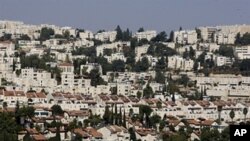U.S. President Barak Obama triggered shock and anger among many Israelis last week when he called for the Israeli-Palestinian conflict to be resolved along the pre-1967 lines with mutually agreed land swaps. Since the 1967 Arab-Israeli war, Jerusalem's Jewish neighborhoods have spread far beyond that armistice line, also known as the Green Line.
Ramot is a suburban-like neighborhood of neatly arranged tract homes on a hilltop overlooking Jerusalem. It sits on land next to what was a battleground between Israeli and Jordanian forces in the Six Day war of 1967, when Israel captured it.
Hilary Herzberger, a Jewish immigrant from South Africa, was among Ramot's early residents. "We wanted to live in a community in Jerusalem and this was the community that was allocated to us to build 116 units. Political issues were never really taken into consideration," she said.
Ramot's residents came here looking for a comfortable, quiet suburban life. They have found it. A new shopping mall is being built next to an expressway that connects the neighborhood to downtown Jerusalem, only a few minutes away.
Shattering the quiet and comfort is the political reality that Ramot is on land beyond the 1967 lines. Like other sections of land adjacent to Jerusalem that Israel captured, the Jewish State annexed Ramot in a move that has never been internationally recognized.
The Israeli government has for decades carried out a policy of building Jewish neighborhoods on a ring around Jerusalem with the aim of securing the city against future attacks.
Palestinian leaders claim the territory where Ramot is, as well as other neighborhoods and East Jerusalem, as part of their future state.
In the shadow of Ramot, Israeli authorities have fenced off the neighboring West Bank Arab town of Beit Iksa and its 27,000 people.
Omar Gayth, deputy head of the town council, says Israel bars Beit Iksa's residents from accessing their farmlands on the other side of the fence. For him, the measures are a stranglehold that should be dealt with first and foremost.
The solution he seeks is not a return to the 1967 borders. He says that what the people of Beit Iksa need is the right to come and go to their land, wherever it is.
The issue of the 1967 lines has long been part of the Israeli-Palestinian peace process, and discussion of it is a sensitive matter for many Israelis.
Hilary Herzberger rules out any return to the armistice lines. Talk of land swaps also makes her nervous.
"If we're talking about Ramot, it's a neighborhood of 45,000 people and we have many neighborhoods similar. There's no possibility. Those neighborhoods today are very much part of Jerusalem and I think it's not even a question and so it was a terrible shock to hear '67 borders," she said.
Many Israelis have praised Prime Minister Benjamin Netanyahu for not giving in to what they perceive as U.S. pressure to relinquish territory.
For Israelis like Herzberger, there is no going back.




